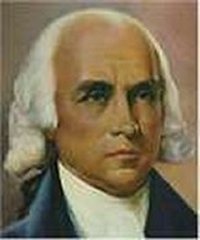February 19 is the 50th day of the year in the Gregorian calendar.
Civilization is the progress toward a society of privacy. The savage’s whole existence is public, ruled by the laws of his tribe. Civilization is the process of setting man free from men.
Read more at brainyquote.com
National Chocolate Mint Day
Birthday of Nicolaus Copernicus (February 19, 1473), Prussian astronomer, mathemetician. His theory of the sun, rather than the earth, being at the center of the solar system was one of the most important scientific hypotheses in history. It was the beginning of modern astronomy.
 Publication of Federalist Paper #57: The Alleged Tendency of the New Plan to Elevate the Few at the Expense of the Many Considered in Connection with Representation. written by Madison in 1788. Since it was assumed that Representatives would be elected from the “aristocracy” of each state, what was to prevent them from favoring their own class to the detriment of the rest of the society. Madison reminds critics that no law could be passed which did not apply to everyone, including the members of Congress. He said: “The house of representatives…can make no law which will not have its full operation on themselves and their friends, as well as the great mass of society. This has always been deemed one of the strongest bonds by which human policy can connect the rulers and the people together. It creates between them that communion of interest, and sympathy of sentiments, of which few governments have furnished examples; but without which every government degenerates into tyranny.”
Publication of Federalist Paper #57: The Alleged Tendency of the New Plan to Elevate the Few at the Expense of the Many Considered in Connection with Representation. written by Madison in 1788. Since it was assumed that Representatives would be elected from the “aristocracy” of each state, what was to prevent them from favoring their own class to the detriment of the rest of the society. Madison reminds critics that no law could be passed which did not apply to everyone, including the members of Congress. He said: “The house of representatives…can make no law which will not have its full operation on themselves and their friends, as well as the great mass of society. This has always been deemed one of the strongest bonds by which human policy can connect the rulers and the people together. It creates between them that communion of interest, and sympathy of sentiments, of which few governments have furnished examples; but without which every government degenerates into tyranny.”
1846 – In Austin, Texas the newly formed Texas state government was officially installed. The Republic of Texas government officially transferred power to the State of Texas government following the annexation of Texas by the United States.
1847 –  The first group of rescuers reached the Donner Party, a group of American pioneer migrants who set out for California in a wagon train. Delayed by a series of mishaps, they spent the winter of 1846–47 snowbound in the Sierra Nevadas. Some of the migrants resorted to cannibalism to survive, eating those who had succumbed to starvation and sickness.
The first group of rescuers reached the Donner Party, a group of American pioneer migrants who set out for California in a wagon train. Delayed by a series of mishaps, they spent the winter of 1846–47 snowbound in the Sierra Nevadas. Some of the migrants resorted to cannibalism to survive, eating those who had succumbed to starvation and sickness.
On February 19, 1859, Daniel E. Sickles, a New York Congressman, was acquitted of murder on grounds of temporary insanity. This is the first time this defense was successfully used in the United States. In Lafayette Square, across the street from the White House, Sickles shot and killed his wife’s lover, the district attorney of the District of Columbia, Philip Barton Key II, son of Francis Scott Key.
Sickles’s career was replete with personal scandals. He was censured by the New York State Assembly for escorting a known prostitute, Fanny White, into its chambers. He also reportedly took her to England, leaving his pregnant wife at home, and presented White to Queen Victoria, using as her alias the surname of a New York political opponent.
The defense argued that “Sickles had been driven insane by his wife’s infidelity, and thus was out of his mind when he shot Key.” Following his acquittal, Sickles then publicly forgave his wife, and “withdrew” briefly from public life, although he did not resign from Congress. The public was apparently more outraged by Sickles’ forgiveness and reconciliation with his wife, whom he had publicly branded a harlot and adulteress, than by the murder and his unorthodox acquittal.
1942 – World War II: President Franklin D. Roosevelt signed the executive order 9066, allowing the United States military to relocate Japanese-Americans to internment camps. Over 110,000 people of Japanese heritage were relocated. 11,000 people of German ancestry and 3,000 of Italian ancestry were also targeted. Internment ended in January, 1945 and the last internment camp was closed in 1946. The executive order was rescinded by President Gerald Ford in 1976.
